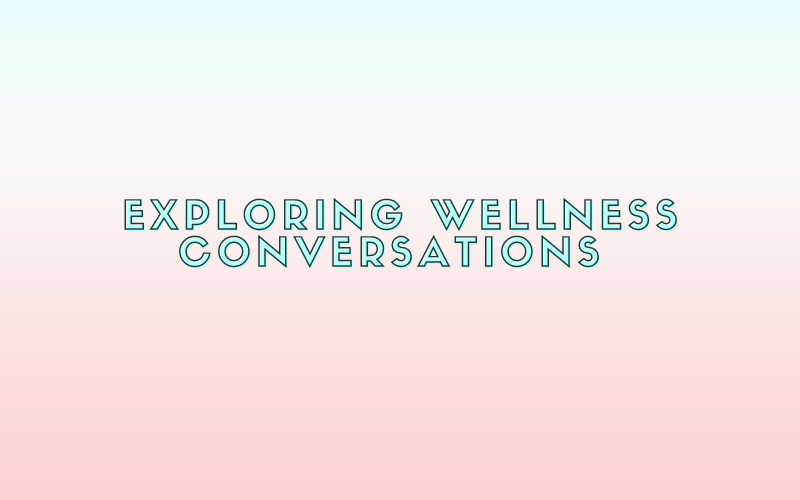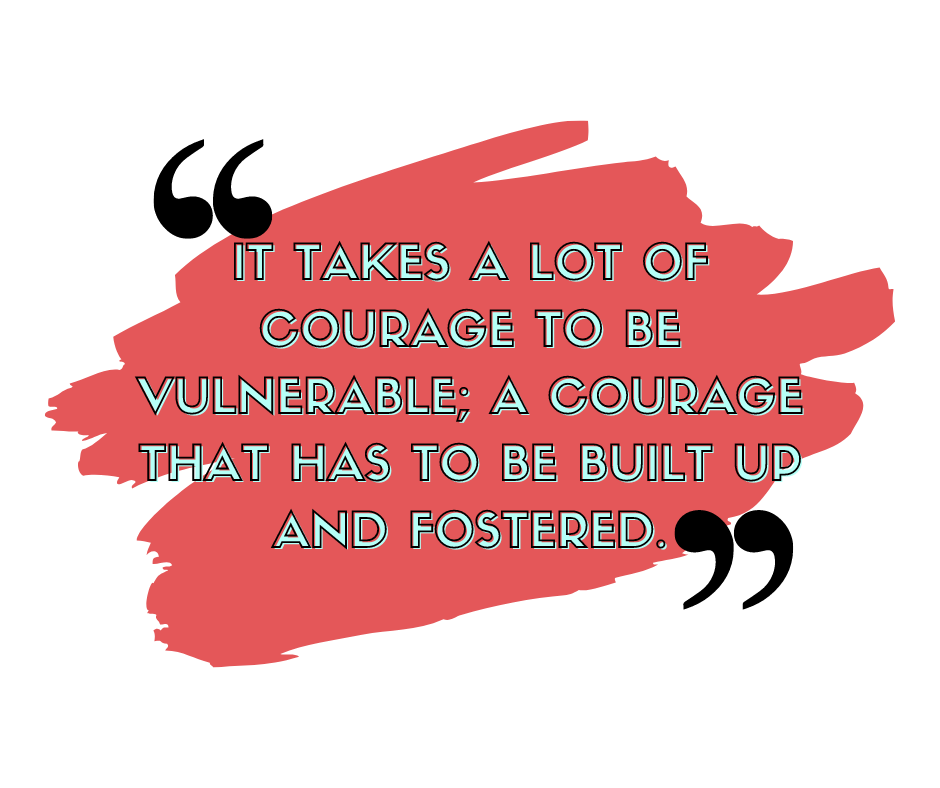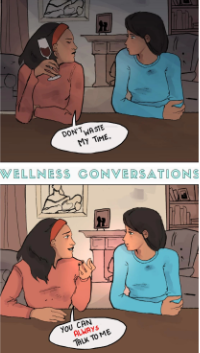
Wellness Conversations
How are you? How was your day? These are simple enough questions that seem to warrant simple enough answers.
“Just be honest. Tell your truth,” they said.
Almost every day, I am asked one or both of these questions by my parents, my peers, or my teachers.
“I’m fine.” That’s too emotionless, I might sound bitter.
“I’m amazing!” Ok, now you’re just overcompensating. Can you even say that believably?
“I’m good.” Perfect, just enough to get through the perfunctory part of the conversation and move on to something a little less mocking.
There is something heartbreaking in the fact that people are asked to share their feelings daily, but many will resort to answers that I have personally found to be inadequate.
A variety of reasons can be attributed to why a person says “I’m good” or another equally predictable answer when asked to express how they are rather than delve into the reality of what they’re feeling. One rationale for why people don’t answer truthfully or completely can perhaps be traced back to how they have previously addressed mental health at home.
For me, there are combined factors that have resulted in me tending to not formally discuss my mental health at home or school. They include mental health only recently became a more mainstream and accepted topic, my perfectionism, and my struggle to get over the mental block that comes from not sharing your deeper feelings for a long period. More often than not, I hold in all the negative emotions and feelings I have, and when it becomes too much, I let it out in an incohesive way. To put it simply, it is an exhausting cycle that leaves me constantly wishing I could articulate myself in a way that makes what I am going through seem normal when I am struggling.
I don’t want to be the person who has to silently suffer, and I don’t want to be the person who adds to the stigma of mental health by not talking about it. But, it takes a lot of courage to be vulnerable; a courage that has to be built up and fostered.
Everyone has points in their life where their mental well-being is unsteady, but mental health stigma disproportionally affects young people, men, minorities, healthcare workers, people in the military, and veterans. There are undoubtedly millions of people around the globe who rarely, if ever, talk about their mental health struggles because they fear invalidation. I can honestly say that it hurts when you believe no person around you can understand what you’re going through.
The truth is sometimes the word “good” does encapsulate the complexity of what is going on within me ‒ and sometimes it doesn’t. I am slowly but surely learning that I, as an imperfect human being, owe it to both myself and those who care about me the most to try to be honest about my mental health.
I cannot remember a time when mental health was not a prevalent discussion in my household. My mother, a passionate advocate for mental health, instilled values of self-care and self-value into me and my siblings. I am lucky enough to say that I was raised in an environment where I was always offered the opportunity to seek help and be provided with the resources to make sure that I was in a stable condition.
Growing up, I was exposed to the ideas of mental health and its importance from a young age. My family knew the importance of mental health from personal experience. Previous members of my family had struggled in silence, never knowing that there was support for them. Yet, they taught me that it’s okay not to be okay sometimes, and that seeking help is a sign of strength, not weakness.
Looking back at it, I can’t say that I would be who I am now without the environment they cultivated for me. Even the littlest things that my family did for me, such as giving me space when I needed some time to myself, or asking me about how they can help me feel more comfortable, made the biggest impact. They taught me strategies to deal with my stress and cope with feelings of negativity. I was grateful that I could come home to a home that made it clear that I was deserving of empathy and care, and that my struggles were valid and deserving of attention. My family made sure that I knew my home was more than just a home — it was a safe space for me.
A recent example of this is a moment I can remember when I admitted to my mom about the stress and anxiety I was experiencing during a rough patch in school. It was difficult because I thought she would very well dismiss it for “teen angst,” and it was even harder for me to rationalize that I wasn’t performing at my best. Yet, my mother took my concerns seriously and offered her support to me because she knew that I needed it. Her little acts of humanity towards me have shaped me into the person I am today.
I am who I am today as a testament to the power of open discussion about mental health. The values that my mother instilled in me about prioritizing my own well-being have helped to give me strength when I reach points in my life that may be tough. The simple, yet deeply complex idea of exploring and assessing your own emotions is a skill that I hope everyone has the chance to develop. My upbringing has taught me that talking about mental health is not just a necessity; It’s a tool to help guide us through some of the hardest parts of life.
Mental health can be addressed in various ways. For some, teachers and school counselors are a helpful addition to aid in their coping mechanisms. For others, however, before push comes to shove, it should be an open time to address mental health, and the conversation starts at home. One may question, how can others, especially the people I live with, learn to support themselves, and myself through this journey we call life.
Filled with variability, the people on your team should be allies and support you in the best way possible. Opening up about your day may bring up negative emotions, and surely talking about your challenges is no easy feat. But over time, the trust you build with parents and caregivers will support you in the good and bad times.
Mental health is a serious topic to discuss and begins by encouraging openness about the positives in your life. Starting with accepting and embracing the conclusive feelings of certainty is just the beginning. Yet, dealing with unwanted emotions can bring up feelings of loneliness and isolation. Isolation, in return, can amplify the impact of illness and even prolong its effects.
Therefore, it is important to note that as humans, perfection does not nor should it exist. Self-acceptance that we need help is the catalyst for reaching out and getting back to ourselves.
Whether you are feeling perpetually anxious about school and stressed about applying to college, or feel lonely at school, time is extremely valuable to address it properly. The first step to talking in the household about mental illness is to plan what you are going to say: how you are feeling and how it is affecting your day-to-day life.
With a clear explanation and greater understanding of what is going on in your life, open communication can segue into how you should be supported best. This may include techniques such as avoiding isolation when feeling depressed or checking in daily how you are doing.
A big misconception surrounding mental health is that it is a choice, their characteristics are identified as their illness, or it is typical for said age group — teens. Debunking these myths, especially when they hit home can be challenging and feel defeating. However, the more you bring up the conversation around mental health and general wellness, you will be supported in a much more meaningful way.
Believe it or not, more people than you think are dealing with similar attributes of mental illness than you think. It is because mental illness is so stigmatized, that the conversation is not brought up and people are suffering alone and in silence.
Now if you were to walk up to your family and say you didn’t feel well because of the common cold, you felt fatigued and could not go to school, would they blame you? Next time you want to bring up the conversation about mental health, eliminate the barriers between the stigma and you. Defy the odds, instead of becoming a statistic. You have the power to make a difference and it starts within the household to break the norms of silently suffering to show a sign of strength.






